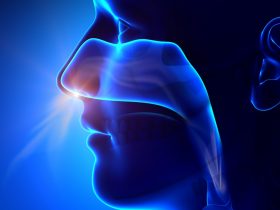At the recent American Rhinologic Society, Combined Otolaryngology Spring Meeting (ARS-COSM) in Boston, Massachusetts (May 4-5, 2023), a research team from Columbia University Medical Center Vagelos, presented a study highlighting the impact of qualitative and quantitative COVID-19 associated olfactory dysfunction (OD) on body mass index (BMI).
Olfactory dysfunction refers to the loss or impairment of the sense of smell, which can be temporary or permanent and can affect people of all ages. Previous research has demonstrated a connection between a poorer sense of smell and obesity, implying that a reduced sense of smell might affect the appetite and contribute to excessive weight gain.
Studies investigating the relationship between BMI and anosmia in COVID-19 patients have produced conflicting results. While olfactory dysfunction can negatively affect various aspects of an individual’s interactions with food, a recent survey has shown that disruptions in chemosensory perception are associated with a decrease in food-related quality of life, weight alterations, difficulty recognizing food, reduced enjoyment of food, and even challenges in cooking. However, limited studies exist on the post-Covid-19 associated chemosensory dysfunction and BMI.
The research team recruited 31 individuals with self-reported olfactory dysfunction. All participants completed surveys, underwent Sniffin’ Sticks tests to assess their sense of smell, and measured their BMI at two separate visits one year apart. In addition to the olfactory tests, the team collected information on demographics, general medical history, COVID-19 history, food insecurity, PHQ-9 scores (a depression assessment), and SNOT-22 scores (a measure of nasal symptoms). Besides, group differences were analyzed using Wilcoxon signed-rank tests, and Holm-Bonferroni correction was used to adjust the significance level.
According to study results, 15 participants presented persistent OD, while 16 participants reported transient OD, with parosmia presented in 19 individuals. Findings revealed that individuals with persistent OD and self-reported parosmia experienced statistically significant increases in their BMI after one year compared to the controls with transient OD and without self-reported parosmia.
“Having chronic quantitative and qualitative olfactory dysfunction as a result of COVID-19 was associated with significant increases in BMI over 1 year, ” the authors mentioned. “This study reinforces prior findings that highlight a connection between olfaction and nutritional status, ” the authors further added. Further large cohort studies are needed to investigate the specific dietary and lifestyle changes that accompany nutritional changes.
The authors of the study were Brandon J. Vilarello, BA; Liam W. Gallagher, MD; Francesco F. Caruana, BS; Jeremy P. Tervo, BS; Joseph B. Gary, BA; and Tiana M. Saak, BA; from Columbia University Vagelos College of Physicians and Surgeons, New York, NY, USA, Patricia T. Jacobson, BSN; David A. Gudis, MD; and Jonathan B. Overdevest, MD, PhD from Department of Otolaryngology-Head and Neck Surgery, New York-Presbyterian/Columbia University Irving Medical Center, New York, NY, USA.
Reference:
Vilarello B, Jacobson P, Gallagher L, et al. BMI Increases in Individuals with COVID-19 Associated Persistent Olfactory Dysfunction ARS-COSM, May 4-5, 2023






